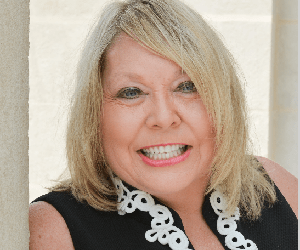
As Hurricane Florence was wreaking havoc in North and South Carolina, Dr. Tammy Totten wasn’t surprised to get a call from the American Red Cross asking for help. The Walden University BS in Human Services faculty member and licensed professional clinical counselor has been a volunteer disaster mental health responder for the Red Cross for nearly 20 years. She has been deployed to numerous natural disasters, including Hurricanes Katrina (2005) and Matthew (2016), as well as F5 tornadoes in Mississippi (2011).
With only 24 hours to respond, Dr. Totten ultimately decided not to deploy to the Carolinas. The linchpin for her decision was access to electricity. Dr. Totten takes her laptop with her on days- and weeks-long deployments so she can continue posting to her online classes and mentoring students. Traveling to an area without electricity may have kept her from teaching her classes and following through on her other client commitments.
Dr. Totten also blogs about her on-the-ground experience after working in the field because she thinks it’s an important educational tool for students to understand what it’s like to be a crisis worker.
“It can help them find their individual path to social change,” says Dr. Totten.
Hours after arriving on-scene, Dr. Totten starts to get a clearer picture on the ways she can make an impact as a disaster mental health responder. The waiting, she admits, is very challenging for her because she wants to hit the ground running as soon as she gets there. She uses her counselor skills and training in the field but does not enter a client/therapist role; instead, she focuses on crisis intervention.
Therapy is a long-term process, explains Dr. Totten. Even short-term therapy is 6–12 weeks, and disaster responders do not have time to work with the community in this way. Instead, she is often sent to help people whose resiliency levels vary greatly and offer them resources and coping techniques. When needed, Dr. Totten intervenes to help evaluate individuals who may need more intense and longer intervention or require hospitalization.
Part of her role also involves looking out for other staff and first responders. Dr. Totten looks for warning signs of distress: If they’re having a tough time, tearing up, or displaying anger or irritability. She will also pull aside staff who are on a continuous cocktail of caffeine and sugar and coach them on taking a much-needed mental health break. Like her, no one ever wants to take a break, but it’s important so they can focus on helping survivors.
“Responding to disasters and crises can be very emotional, but it’s critical to create emotional space while on deployment,” explains Dr. Totten. “How can I help someone who is drowning if I can’t swim either? Responders learn to adapt to helping others without hurting themselves in the process. It’s in the best interests of survivors, and that’s who we’re there to help.”
To ensure first responders and mental health professionals are also getting the proper care they need to do their jobs effectively, mandatory debriefs with Red Cross mental health counselors are provided. This important part of the process allows volunteers to talk about self-care when they return home and start the transition back to normal life after witnessing so much death and destruction.
“You’re so exhausted and feel sad about leaving because there’s always a job unfinished, even if you know there are other volunteers ready to pick up where you left off,” says Dr. Totten. “When responders return home, it’s clear friends and family care about them and believe the work they are doing is important, but it can be frustrating because they just can’t fully understand the experience.”
The ability to handle high-stress emergency crisis intervention does not come easily to many people. Dr. Totten says disaster responders should be resilient and able to handle many different situations while keeping safe. They need to be flexible and able to follow instructions because they could be asked to perform important tasks outside of their original scope.
Watch Dr. Totten talk about how she assists survivors following a 2011 tornado.



